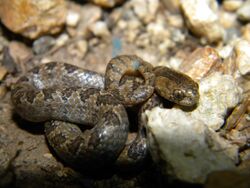Biology:Sibon sanniolus
| Sibon sanniolus | |
|---|---|

| |
| Scientific classification | |
| Domain: | Eukaryota |
| Kingdom: | Animalia |
| Phylum: | Chordata |
| Class: | Reptilia |
| Order: | Squamata |
| Suborder: | Serpentes |
| Family: | Colubridae |
| Genus: | Sibon |
| Species: | S. sanniolus
|
| Binomial name | |
| Sibon sanniolus (Cope, 1866)
| |
| Synonyms[2] | |
| |
Sibon sanniolus, commonly known as the pygmy snail-eating snake or the pygmy snail sucker, is a species of small snake in the family Colubridae. The species is endemic to Central America and southeastern Mexico.
Geographic range
S. sanniolus is found in Belize, Guatemala, and the Mexican states of Campeche, Quintana Roo, and Yucatán.[1][2][3]
Habitat
Sibon sanniolus is a relatively common snake that occurs in tropical semi-deciduous forest and thorn forest, and also in degraded forest.[1]
Reproduction
S. sanniolus reaches sexual maturity in eight months and produces a single clutch per year.[4]
Subspecies
Two subspecies are recognized as being valid, including the nominotypical subspecies.[2]
- Sibon sanniolus neilli Henderson, Hoevers & Wilson, 1977
- Sibon sanniolus sanniolus (Cope, 1866)
Nota bene: A trinomial authority or a binomial authority in parentheses indicates that the subspecies or species was originally described in a genus other than Sibon.
Etymology
The subspecific name, neilli, is in honor of American herpetologist Wilfred T. Neill.[5]
References
- ↑ 1.0 1.1 1.2 "Sibon sanniolus". IUCN Red List of Threatened Species 2013: e.T63920A3131114. 2013. doi:10.2305/IUCN.UK.2013-2.RLTS.T63920A3131114.en. https://www.iucnredlist.org/species/63920/3131114.
- ↑ 2.0 2.1 2.2 Sibon sanniolus at the Reptarium.cz Reptile Database. Accessed 19 April 2015.
- ↑ Campbell JA (1999). Amphibians and Reptiles of Northern Guatemala, the Yucatan, and Belize. Norman, Oklahoma: University of Oklahoma Press. pp. 243–244. ISBN 978-0-8061-3066-8.
- ↑ Zug GR (1993). An Introductory Biology of Amphibians and Reptiles. Academic Press. p. 150. ISBN 978-0-12-782622-6.
- ↑ Beolens, Bo; Watkins, Michael; Grayson, Michael (2011). The Eponym Dictionary of Reptiles. Baltimore: Johns Hopkins University Press. xiii + 296 pp. ISBN:978-1-4214-0135-5. (Sibon sanniolus neilli, p. 188).
Further reading
- Cope ED (1866). "Fifth Contribution to the Herpetology of Tropical America". Proc. Acad. Nat. Sci. Philadelphia 1886: 317–323. (Mesopeltis sanniolus, new species, p. 318).
- Boulenger GA (1896). Catalogue of the Snakes in the British Museum (Natural History). Volume III., Containing the Colubridæ (Opisthoglyphæ and Proteroglyphæ), Amblycephalidæ, and Viperidæ. London: Trustees of the British Museum (Natural History). (Taylor and Francis, printers). xiv + 727 pp. + Plates I-XXV. (Leptognathus sanniola, p. 459).
- Heimes, Peter (2016). Snakes of Mexico: Herpetofauna Mexicana Vol. I. Frankfurt, Germany: Chimaira. 572 pp. ISBN:978-3899731002.
Wikidata ☰ Q3022818 entry


